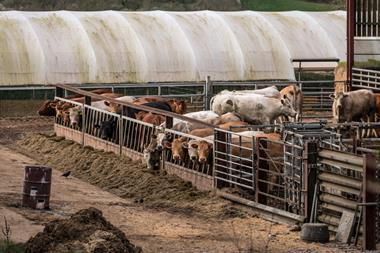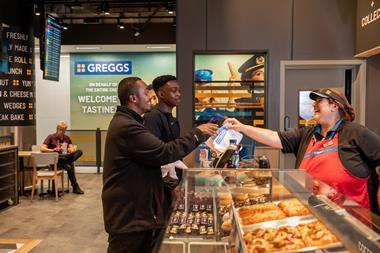The market has the potential to slide into a bottomless pit'
Official announcement of an EU-approved scheme for subsidising the storage of surplus home-killed lamb to prevent an autumn market collapse was expected as The Grocer went to press, but it was clear prices were already sliding.
At retail there was evidence of something more than the normal seasonal discounting. Somerfield was offering legs at prices slashed by a third, and MLC's national survey of retail outlets had earlier shown many cuts at least 5% cheaper on the week.
Reliable national average prices at farmgate and wholesale are, however, harder to establish due to the complications caused by FMD.
With live auctions prohibited, and direct sales from farms to slaughtering plants distorted by restrictions, values comparable with those in previous seasons cannot be established reliably.
However, it appears the market is now weaker than a year ago, when the Standard Quality Quotation for lambs in Great Britain was about 90p per kg liveweight, despite present slaughter numbers being much lower.
There is general agreement in the industry that DEFRA or Brussels must do something to support the market, as the UK trade will be unable to absorb the numbers due to come off the farms in the next few months with export sales prohibited due to FMD.
However, the specific proposals (PSA and/or purchase for destruction) put forward are contentious.
A statement issued on Monday by Scottish Association of Meat Wholesalers president Neil Stoddart warned "unless action is taken soon, the market has the potential to slide into a bottomless pit".
Stoddart expressed fear of inappropriate action: "Some of the surplus management suggestions....look more bad than good from the industry's long-term perspective. As we saw from the introduction of the FMD welfare disposal scheme, the setting of incorrect payment rates causes havoc with the real trade."
This reflected concern in the industry, especially in Scotland, that buying-in or subsidising the storage of lambs could cause commercial damage, perhaps pricing stock beyond the reach of processors who had invested in marketing campaigns, or merely postponing the price collapse until next year.
{{M/E MEAT }}
Close menu
- Home
- Retail & Wholesale
-
Products & Suppliers
- Back to parent navigation item
- Products & Suppliers
-
Product Categories:
- Back to parent navigation item
- Product Categories:
- Alcoholic drinks
- Bakery
- Cereals & breakfast
- Cheese
- Chicken & poultry
- Chocolate
- Confectionery
- Crisps, nuts & snacks
- Dairy
- Fish
- Fresh produce
- Frozen
- Household
- Meat
- Own Label
- Sauces & condiments
- Seasonal
- Soft drinks
- Vaping
- Vegan & plant-based
- World foods
- Suppliers
- People
- Reports & Data
-
Topics A-Z
- Back to parent navigation item
- Topics A-Z
-
Popular topics:
- Back to parent navigation item
- Popular topics:
- Cost of living crisis
- Crime
- Deposit Return Schemes
- Finance
- Government & Regulation
- Health
- Inflation
- Loyalty
- Marketing
- Mergers & Acquisitions
- New Product Development
- Sourcing
- Supply chain
- Sustainability & environment
- Technology
- Ultra Processed Foods
- Vaping
- A-Z all topics
- Content by type:
- Events
- Ask iA (beta)
- Subscribe now
Sign in to comment on this article
Not logged in before? Register for FREE guest access today.
You will be able to:
- Read more stories
- Receive daily newsletters
- Comment on stories
Advert
Related articles
-

-

-

10 charts that explain UK attitudes to food provenance
Paid for and in partnership with Cymru Wales
-














No comments yet